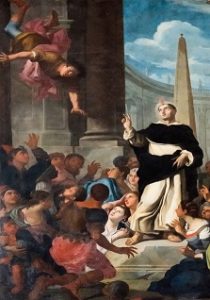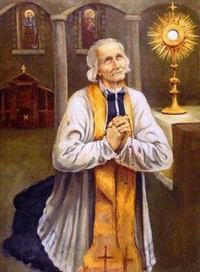
St. Vincent Ferrer O.P.
SERMON ON THE LAST JUDGMENT – Mt 25:33 Sheep and goats
Mt 25:32-36
And all nations shall be gathered together before him, and he shall separate them one from another, as the shepherd separateth the sheep from the goats: And he shall set the sheep on his right hand, but the goats on his left. Then shall the king say to them that shall be on his right hand: Come, ye blessed of my Father, possess you the kingdom prepared for you from the foundation of the world. For I was hungry, and you gave me to eat; I was thirsty, and you gave me to drink; I was a stranger, and you took me in: Naked, and you covered me: sick, and you visited me: I was in prison, and you came to me.
“And he shall set the sheep on his right hand” Mt 25:33
For the explanation of this text, approaching the material to be preached, you should know, that Christ speaking of his coming for judgment said, “And when the Son of Man shall come in his majesty, and all the angels with him, then shall he sit upon the seat of his majesty. And all nations shall be gathered together before him, and he shall separate them one from another, as the shepherd separates the sheep from the goats. And he shall set the sheep on his right hand, but the goats on his left.” (Mt 25:31-33). Note, “In majesty,” for in his first coming, to accomplish the redemption, he did not come in majesty, but in humility and poverty. But in the second coming when he will come for rendering repayment, he will not come in humility and poverty but in such majesty and power that the whole world will tremble.
You know how? Note by a comparison to a tree with birds, many birds singing and flitting about [saltantes]. But when the falcon comes, they tremble and are frightened. So this world is like the tree bearing wicked fruits, of vanities, of pomp and delights, and some wish to fill their lap or stuff their mouth, and some search everywhere for these mundane things. In this tree all creatures, like the birds, are playing, like the Sun, and Moon and Planets; their motions and eclipses, etc. Also the elements. Sometimes the earth produces herbs, plants, flowers and fruits, and at another time lets them all go, in autumn. Water sometimes flows etc, sometimes not. The same of air. So now the birds in truth sing [in vere cantant], and mate [faciunt matrimonium], for each wants his own, so that all creatures seem to be playing. But when the falcon comes and circles, the great eagle, the Lord Jesus Christ, the whole world shall fear. For the Sun shall stand still in the East, and the Moon in the West, so that they will not move themselves, nor also the stars, and all the mountains will melt etc. For this reason the church in the person of an individual Christian prays, “Deliver me, O Lord, from eternal death,”(from the Requiem Mass). If therefore the heaven and earth and other sinless creatures which have never violated the precept of God should fear, what shall you do, who sin often, how many oaths, how many corrupt deeds have you done etc. Then the sinners would prefer to be in hell than to face the angry judge. So Job says in the person of the sinner, “Who will grant me this, that you may protect me in hell, and hide me till your wrath passes,” (Job 14:13). Then they shall say “to the mountains and the rocks: Fall upon us, and hide us from the face of him who sits upon the throne, and from the wrath of the Lamb,” (Rev 6:16).
But those of good life, who in this world lived according to divine commands, and not according to their own inclinations, then they shall not fear, but they shall rejoice saying, “Lord I have desired this day; I now shall be glorified in body and soul,” and so they say, “Glory to thee O Lord,” etc., therefore Christ said, “But when these things begin to come to pass, look up, and lift up your heads,” Gloss: rejoice in your hearts, “because your redemption is at hand,” (Lk 21:28).
Second, he says, “then shall he sit upon the seat of his majesty,” (Mt 25:31), because a judge passes sentence sitting. So he, as the universal judge of all shall sit in judgment, not on the earth, but in the air, so he may be seen by all. The wicked shall see his humanity, the good, however, the humanity and divinity. And the Virgin Mary shall sit with him, and the apostles, and all those who held to the apostolic life. Authority: “Behold we have left all things, and have followed thee: what therefore shall we have? And Jesus said to them: Amen, I say to you, that you, who have followed me, in the regeneration, when the Son of man shall sit on the seat of his majesty, you also shall sit on twelve seats judging the twelve tribes of Israel,” (Mt 19:27-28). O how much should we strive to obtain this honor? Also, “all nations shall be gathered together before him, and he shall separate them one from another, as the shepherd separates the sheep from the goats: And he shall set the sheep on his right hand, but the goats on his left,” (vv 32-33). Thus the theme of the text is clear.
And I am in the moral material, therefore on that day only the sheep shall be on his right hand, when he says, “And he shall set,” etc. Therefore, on that day it will be better to be a sheep of Jesus Christ that to have been a pope, or king, or emperor. Now, I see in sacred scripture that a man becomes and is revealed to be a sheep of Jesus Christ from five virtues, even if he had been the devil’s goat before, namely by:
Simple innocence,
Ample mercy,
Steadfast patience,
True obedience,
Worthy penance.
SIMPLE INNOCENCE
First, the first virtue is when a man lives simply, nor hurts anyone in his heart, by hating, nor by defaming in speech, nor striking with hands, nor by stealing, and so such a life is called simple innocence, which makes a man a sheep of Christ. Reason: For just as a sheep does not strike with horns like a bull, nor bite with its teeth like a wolf, nor strike with hooves like a horse, but lives simply, so also if you wish to be a sheep of Christ, you should strike no one with horns of knowledge or of power, for lawyers strike by the horns of knowledge, jurists, advocates, or men who have great knowledge. Merchants too, by deceiving others. Lords and bullies strike with the horns of power, plundering or injuring, and extorting, using calumnies and threats, and the like. Listen to what the Lord says by the mouth of David, “And I will break all the horns of sinners: but the horns of the just shall be exalted,” (Ps 74:11).
Also you should not bite with teeth as wolves do. By defaming you bite the reputation of your neighbor, by saying such and such happened. To defame someone is nothing else but to bite. Therefore, defamers are not the sheep of Christ, but wolves of hell. So the Apostle [Paul], “For all the law is fulfilled in one word: You shall love your neighbor as yourself. But if you bite and devour one another; take heed you be not consumed one of another,” (Gal 5:14-15). Note the difference between biting and devouring, because to bite is to take a chunk, to devour is to swallow it all. They bite, who on one hand praise a man or woman, and on the other defame them by saying: “Do you know something. O, he is a good man and a good woman, but he has this defect.” See, a bite out of his reputation. They devour when they say nothing good praising someone, but only the bad. See why the Apostle says, “If you bite…”
Also, you should not kick with your feet like horses. For they kick with their feet when they despise someone. Therefore children, do not hate your parents; nor parents, children; nor young people, old folks; nor the healthy, the sick; nor rich, the poor; nor masters, their servants; nor prelates, their clergy; and vice versa, but like sheep, everyone should bear themselves innocently toward all. So Christ said, “See that you despise not one of these little ones,” (Mt 18:10). It is clear, then what is simple innocence. Innocent, as if not-harming. [non nocens], for such shall be the sheep of Jesus Christ, and they shall be on his right hand with the angels of God.
Note here the story of David who although he had been the most holy, nevertheless sinned in counting the people, on account of which God sent a plague on the people, so that in three days seventy thousand men had died, twenty years old and up, besides the women and children, who were about the same number. David seeing the people dying, in whom he was punished, was more willing to die himself said, “It is I; I am he who has sinned, I have done wickedly: these that are the sheep, what have they done? Let your hand, I beg you, be turned against me, and against my father’s house,” (2Kg 24:17). Behold, here is simple innocence!
AMPLE MERCY
The second virtue, ample mercy, is when goods, both temporal and spiritual given to you by God, are given out and distributed to the needy. This is how one becomes a sheep of Christ. Reason: Because among all the animals a sheep is the most beneficial of animals. For the sheep by growing wool, shows us mercy and benefits of mercy, because how many poor people does a sheep clothe? For none of us would have been clothed in wool unless the sheep had given it to us. Also it gives us milk, and lambs to eat, etc. Therefore if you wish to be likened to it, you shall be the sheep of Christ, by giving wool, i.e. external and temporal goods, bread and wine, money and clothes and the like. If you have poor in your town or village, give them this “wool.” Second, by giving “milk,” that is, interior and spiritual goods, by giving good teaching to the ignorant, as I am giving to you now. If you have the milk of knowledge, of devotion, or of eloquence, you should give to those not having them. Remember the story of the gospel, for he says, “For I was hungry, and you gave me to eat; I was thirsty, and you gave me to drink; …Naked, and you covered me,” (Mt 25:35-36). Note also in the legend of St. Martin we read that once, on the road, wondering at a sheared sheep, the disciples questioned, “Father, why are you amazed?” Replying, he said: “This sheep fulfilled the precept of the gospel which says, ‘He that hath two coats, let him give to him that hath none; and he that hath meat, let him do in like manner,'” (Lk 3:11).
STEADFAST PATIENCE
The third virtue is steadfast patience, and this when a man suffering from injuries inflicted or spoken to him does not want to concern himself with taking revenge. Rather he loves everyone in general, and prays for them all. This virtue makes a man a sheep of Christ. Reason: Because a sheep is a most patient animal, for if harassed while eating, or if struck, it does not defend itself, but goes elsewhere, nor does it avenge itself like a dog or a goat would do, but humbly yields. O blessed is the person, man or woman, who has such patience, and takes no vengeance for injuries, but forgives, as God forgives him. Therefore the Apostle Paul writes: “If it be possible, as much as is in you, have peace with all men. Defend not yourselves,” the Gloss has “revenge not…,” “my dearly beloved; but give place unto wrath, for it is written: Revenge is mine, I will repay, says the Lord. But if your enemy be hungry, give him to eat; if he thirst, give him to drink,” (Rom 12:18-20), like a sheep. Note: “Revenge is mine.” And so a man ought not to usurp the rights of God, otherwise etc.
Temporal lords and judges can inflict and ought to inflict juridical vengeance with due process, because justice is enforced without sin. Also the remission of injuries is meritorious. For the patient ones are likened to Christ, about which Isaiah 53 said: “He shall be led as a sheep to the slaughter, and shall be dumb as a lamb before his shearer, and he shall not open his mouth,” (v. 7). So the apostle [Peter], “you should follow his steps. Who did no sin, neither was guile found in his mouth. Who, when he was reviled, did not revile: when he suffered, he threatened not,” (1Pt 2:21-23).
TRUE OBEDIENCE
The fourth virtue is true obedience, when a man in his life does not do anything neither in thinking, nor speaking, nor acting according to his own will and inclination but according to the divine will and ordination, such a one is a sheep of Christ. Reason: For already you see how sheep are obedient to the shepherd. For a boy or girl with a small staff can easily guide thirty or forty sheep; it is otherwise with goats or kids, because a shepherd is needed for each one. If therefore on the Day of Judgment you wish to be a sheep of Christ, you will be obedient to the shepherd, namely to him who said: “I am the good shepherd; and I know mine, and mine know me,” (Jn 10:14).
Let us see now, what this shepherd commanded. First that we live humbly. Matthew 11: “learn of me, because I am meek, and humble of heart,” (Mt 11:29). “Be you humbled therefore under the mighty hand of God,” (1 Pt 5:6), namely of your shepherd etc. Whoever therefore wishes to go by the path of pride, is not a sheep of Christ but a goat of the devil.
Second, that in giving we take the way of mercy and generosity. “Be ye therefore merciful, as your Father also is merciful,” (Lk 6:36). Also by lending, in the same citation,: “Lend, hoping for nothing thereby: and your reward shall be great, and you shall be the sons of the Highest; for he is kind to the unthankful, and to the evil,” (Lk 6:35). Therefore whoever disobediently goes by the way of avarice by committing usury, robbery, theft etc, is not a sheep of Christ, but a goat of the devil.
Third, that we walk by the way of cleanness, of chastity etc. Matt. 19: ” [There are those] who have made themselves eunuchs for the kingdom of heaven. He that can take, let him take it.” (Mt 19:12). And 1 Thess 4: “For this is the will of God, your sanctification;…That every one of you should know how to possess his vessel in sanctification,” (vv. 3-4). Whoever therefore goes by the way of uncleanness and the filthiness of lust and carnality, such is not a sheep of Christ but a goat of the devil, to whom Christ said, “But you do not believe, because you are not of my sheep. My sheep hear my voice:” obediently, “…and they follow me. And I give them life everlasting,” (Jn 10:26-28).
WORTHY PENANCE
The fifth virtue is worthy penance, for sins committed. Because no one can be exempt from sins. And so it is said: “For there is no just man upon earth, that does good, and sins not,” (Eccl 7:21). Therefore worthy penance is necessary, by sorrowing for sins and proposing not to relapse, confessing, and making satisfaction. And in this way penance makes a man a sheep of Christ. Reason: For a sheep and goat differ. Because a sheep covers its private parts with a tail, but not so a goat. Rather it shows everything. Now you know who is a sheep and who a goat. All– how many we are – have “private parts” of sins, which, although they are not now apparent, nevertheless on the Day of Judgment all evils and sins will be out in the open. Just as the enormous sins of those who are condemned are made evident, and placed on the scale with the parchment, on the face of which the sins are pictured. O how many hidden evils the dish reveals. Many men and women who now are believed to be good people, who, when they are then seen, it will be said, “Who is he?”, and “Is not he the one so religious?” O for the hypocrite traitor. Same for clergy, laity and women. But if the private parts of sins are covered here with the tail of penance, then they will not be revealed to your confusion, nor to your shame.
And note here the example of the squire who confessed in a stable who covers his sins with confession, you understand with the tail of penance. For thus he covers sin, so the devil will not remember. And it is no wonder then if they are forgotten by the devil, because they are also forgotten by God. Authority: “But if the wicked does penance for all his sins which he has committed, and keeps all my commandments, and does judgment, and justice, living he shall live, and shall not die. I will not remember all his iniquities that he has done,” (Ez 18:21-22). So David says in Psalm 31: “Blessed are they whose iniquities are forgiven, and whose sins are covered,” (Ps 31:1), namely, by the tail of penance.
A goat, however, which shows all, stands for the notoriously shameless person, because everyone knows his wicked life and sins, like wicked clergy, and other notorious cohabiters [concubinarii], nor do they wish to cover it up with the tail of penitence; they are impenitent. Therefore we should do penance. Now you see why the theme says, “He shall set the sheep on his right hand,” (Mt 25:33). Thanks be to God.





